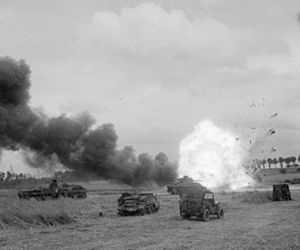Operation Epsom
| Operation Epsom | |||||||
|---|---|---|---|---|---|---|---|
| Part of the Battle for Caen | |||||||
 An ammunition carrier of the British 11th Armoured Division explodes after it is hit by a mortar round during Operation Epsom, 26 June 1944. |
|||||||
|
|||||||
| Belligerents | |||||||
|
|
|
||||||
| Commanders and leaders | |||||||
|
|
|
||||||
| Strength | |||||||
| 2 infantry divisions 1 armoured division 1 armoured brigade 1 tank brigade |
3 SS panzer divisions 5 ad-hoc battle groups 1 SS heavy tank battalion |
||||||
| Casualties and losses | |||||||
| 4,020–4,900 casualties 150 tanks damaged or knocked out |
Over 3,000 casualties 125–126 tanks damaged or knocked out |
||||||
|
|
|||||||
| Operation Epsom | |
|---|---|
| Operational scope | Strategic Offensive |
| Planned by | British Second Army |
| Objective | Break out of the bridgehead west of Caen, advance across the Orne River and capture the high ground south of Caen, near Bretteville-sur-Laize |
| Executed by | VIII Corps, Second Army; supporting attacks made by elements of XXX Corps. |
| Outcome | Inconclusive |
Operation Epsom, also known as the First Battle of the Odon, was a British Second World War offensive that took place between 26 and 30 June 1944, during the Battle of Normandy. The offensive was intended to outflank and seize the German-occupied city of Caen, an important Allied objective, in the early stages of the Allied invasion of north-west Europe.
Preceded by Operation Martlet to secure the right flank of the advance, Operation Epsom began early on 26 June, with units of the 15th (Scottish) Infantry Division advancing behind a rolling artillery barrage. Air cover was sporadic for much of the operation, because poor weather in England forced the last-minute cancellation of bomber support. Accompanied by the tanks of the 31st Tank Brigade, the 15th (Scottish) Division made steady progress and by the end of the first day had overrun much of the German outpost line, although some difficulties remained in securing the flanks. In mutually costly fighting over the following two days, a foothold was secured across the River Odon and efforts were made to expand this, by capturing strategic points around the salient and moving up the 43rd (Wessex) Infantry Division. In response to powerful German counter-attacks, by 30 June some of the British forces across the river were withdrawn, bringing the operation to a close.
Many casualties were suffered by both sides but unlike General Bernard Montgomery, the Allied commander in Normandy, Generalfeldmarschall Erwin Rommel was unable to withdraw units into reserve after the battle, as they were needed to hold the front line. The British retained the initiative, attacked several more times over the following two weeks and captured Caen in Operation Charnwood in mid-July. Interpretations of the intention and conduct of Operation Epsom differ widely but there is general agreement concerning its effect on the balance of forces in Normandy. The Germans contained the offensive but only by committing all their strength, including two panzer divisions newly arrived in Normandy, which had been intended for an offensive against British and American positions around Bayeux.
...
Wikipedia

